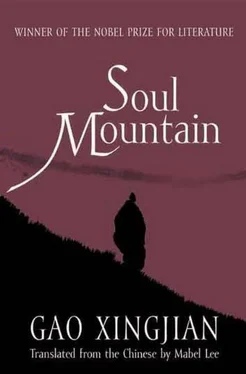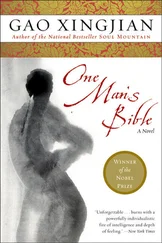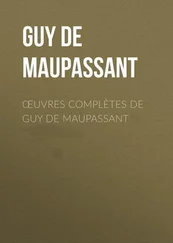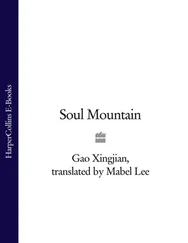When I decided to stay, a cadre who had come in the prefectural car warned that there wouldn’t be a car if I left tomorrow. I said if I couldn’t stop a passing car I’d walk. However, he was very kind and fetched a couple of cadres from the Miao village, entrusting me to their care, and telling them, “If anything happens you’ll be responsible!” The secretary and the town head nodded profusely and said, “You can relax, everything will be fine.”
When I return to the small building of the town administration office, no-one is there and it is locked up. The party secretary and town head I expect will wake up somewhere from a drunken stupor tonight. Afterwards I don’t see anyone wearing a four-pocket cadre jacket and who can speak Chinese and I feel suddenly liberated and freely wander about the stockade.
On the old streets and lanes running along the river, every household is entertaining relatives. Where there are large numbers of guests, tables are laid out onto the street and buckets of rice, bowls and chopsticks are by the door. Lots of people are helping themselves and no-one is keeping watch. I’m hungry and can’t worry about standing on ceremony, and in any case I can’t communicate, so I also help myself to a bowl and chopsticks and end up with people continually urging me to eat. This is probably an ancient Miao tradition and I have seldom enjoyed such freedom.
The love songs start at dusk, at first drifting across from the other side of the river. The bamboo groves on the mountain opposite are bathed in the gold of the lingering rays of the sun while this side of the river is already cloaked in night. Young women in groups of five or six come to the river-bank, some standing in a circle and others holding hands, and begin calling their lovers. Melodious singing rapidly fills the vast night. Young women are everywhere, still with their parasols up and also holding a handkerchief or a fan. There are also some thirteen- or fourteen-year-old girls who are just becoming aware of boys.
In each group, one girl leads the singing and the other girls harmonize. I observe that the lead singer is invariably the prettiest of the group, I suppose choice by beauty is a fairly natural principle.
The voice of the lead singer rises in the air and I can’t help noticing her utter sincerity. The correct word is perhaps not “sing”, for the clear shrill sounds come from deep within so that body and heart respond. The sounds seem to travel from the soles of the feet then shoot up between the eyes and the forehead before they are produced — no wonder they’re called “flying songs”. It is totally instinctive, uncontrived, unrestrained and unembellished, and certainly devoid of what might be called embarrassment. Each woman exerts herself, body and heart, to draw her young man to her.
The young men are even less inhibited and come right up to the women to choose the one they like best, as if they are choosing a piece of fruit. At this point the women move their handkerchiefs and fans, and the more they are examined the more feeling they put into their singing. When a conversation starts, the young man takes the woman’s hand and they walk off together. The marketplace with its stalls thronging with ten thousand heads during the daytime is now a vast singing stadium. I am suddenly surrounded by an expanse of passions and think that the human search for love must originally have been like this. So-called civilization in later ages separated sexual impulse from love and created the concepts of status, wealth, religion, ethics and cultural responsibility. Such is the stupidity of human beings.
Night grows palpably thick, the sound of the drums ceases and the black surface of the river is dotted with the lights of the boats. I suddenly hear someone call out in Chinese, “older brother”, and the voice seems to be right near me. I turn and see four or five girls on the slope all singing to me. One again calls out in a clear voice “older brother”. At this point, I realize this is probably all the Chinese she knows but it would be enough to seek love. I see her expectant eyes in the darkness, unblinking and fixed on me. My heart starts pounding and I seem to return to the long-lost trembling of my passionate youth. I am drawn to her, perhaps affected by the actions of the young men here, perhaps because of the darkness. I see her lips moving slightly although she doesn’t speak again and just waits, and the singing of her companions grows soft. She is still a child, her face hasn’t lost that childish look — the high forehead, upturned nose, small mouth. If I give the slightest sign I know she will come away with me, snuggle up and, all excited, put up her parasol. But this tension is unbearable. I quickly smile, no doubt very awkwardly, resolutely shake my head, then turn and walk away, not daring to look back.
I’ve never encountered this style of love. It’s what I dream about but when it actually happens I can’t cope.
I should confess that the low bridge and upturned nose, high forehead, small mouth and expectant bright eyes of the Miao girl revived painful, tender feelings which had long since become forgotten memories. But I am instantly aware that I can no longer return to those pure passions. I must face the fact that I have become old. It is not just age and various other intangible differences even if she is right here and I can just reach out and take her with me. It amounts to the fact that my heart is old and I can no longer ignore all else and fall in love, body and heart, with a young woman. My relationships with women changed long ago and lost this instinctive youthful love… only lust remains. I’m afraid of shouldering the responsibility of even pursuing momentary happiness. I’m not a wolf but I would like to be a wolf, to return to nature, to go on the prowl. However, I can’t rid myself of this human mind. I am a monster with a human mind and can find no refuge.
Reed pipes sound. On the river-bank by clumps of bushes, lovers embrace under parasols, no longer as couples between heaven and earth but immersed in worlds of their own. But their worlds are remote from me, just like an ancient legend. Sadly, I walk away.
At the reed pipe venue by the highway, a bright kerosene lamp hangs on top of a bamboo pole. Her head is covered with a black cotton scarf and her hair held in a silver ring on top. The silver crown with a dragon and phoenix centre-piece she wears is flanked by five phoenix feathers of beaten silver-leaf which tremble as she moves. The feathers on the left are threaded with a coloured ribbon which hangs to her waist and accentuates her graceful body in dance. Her black gown is drawn in at the waist and the wide sleeves show her silver bracelets. In her black headscarf and black gown only the neck with its pair of big heavy silver rings shows, and over her slightly raised breasts is a spread of delicate longevity chains made of interlocking silver rings.
She knows what she is wearing is more striking than the colourful embroideries of other women and the abundance of silver indicates her high status. Her bare feet are also beautiful and the two silver bracelets on her ankle clink like crystal as she dances to the pipes.
She is from the Black Miao mountain stockade, a beautiful white orchid produced there. Her bright red lips are like the camellias of early spring and her teeth are like small pearls. Her flat childlike nose and round face make her eyes look far apart, always smiling, and the flashing black pupils of her eyes add to her extraordinary radiance.
She doesn’t need to go to the river-bank to seek a lover. The toughest young men of every stockade come to bow to her, shouldering reed pipes twice their height tied with flowing ribbons. They puff out their cheeks, sway, step back and forth stamping their feet to get the women in their multi-pleat skirts swaying with them, but she has only to lightly lift a graceful foot to get all of them bowing, and blowing so hard that they wreck their pipes and develop blood blisters on their lips! It is the vitality she exudes that gives her this arrogance.
Читать дальше
Конец ознакомительного отрывка
Купить книгу












